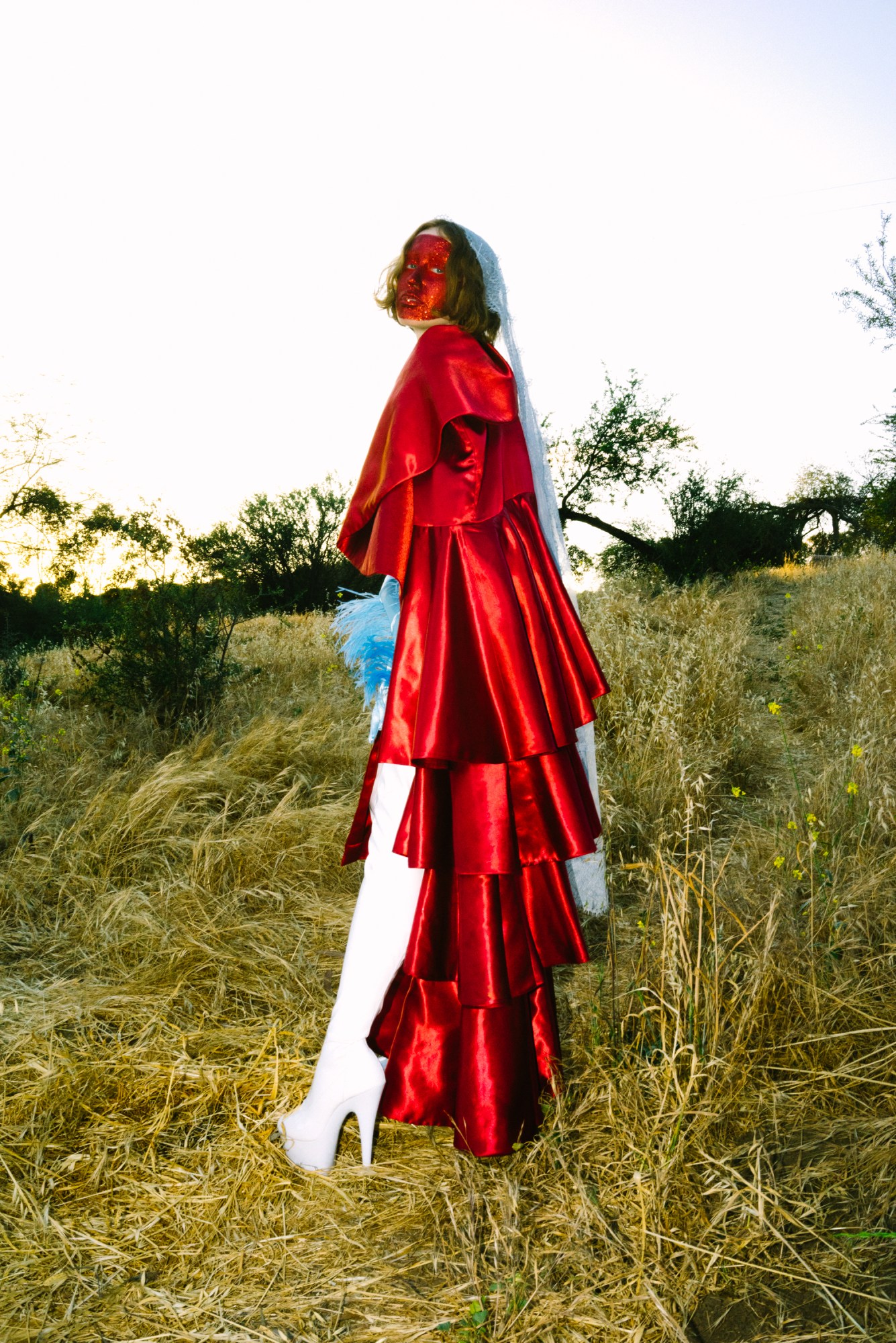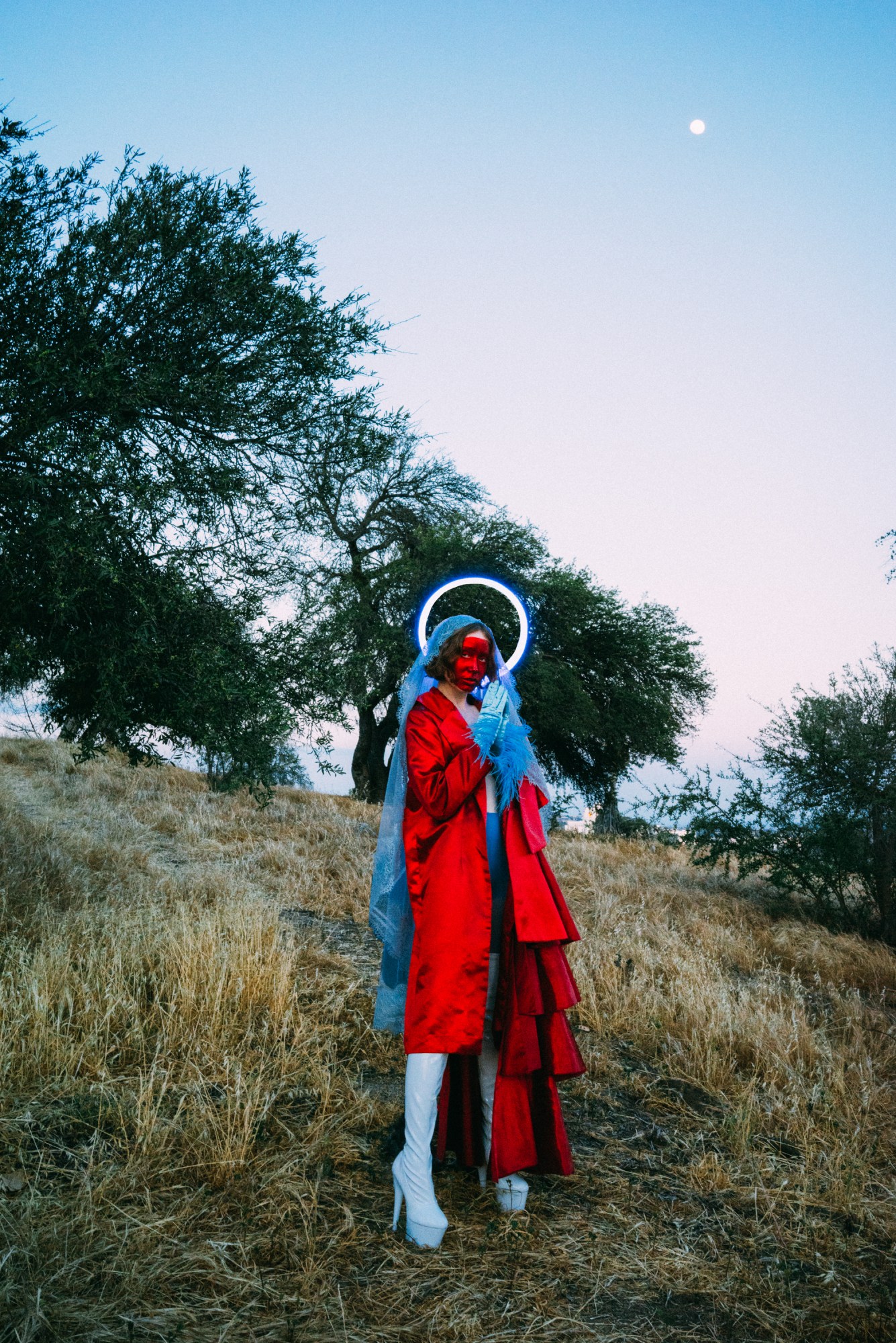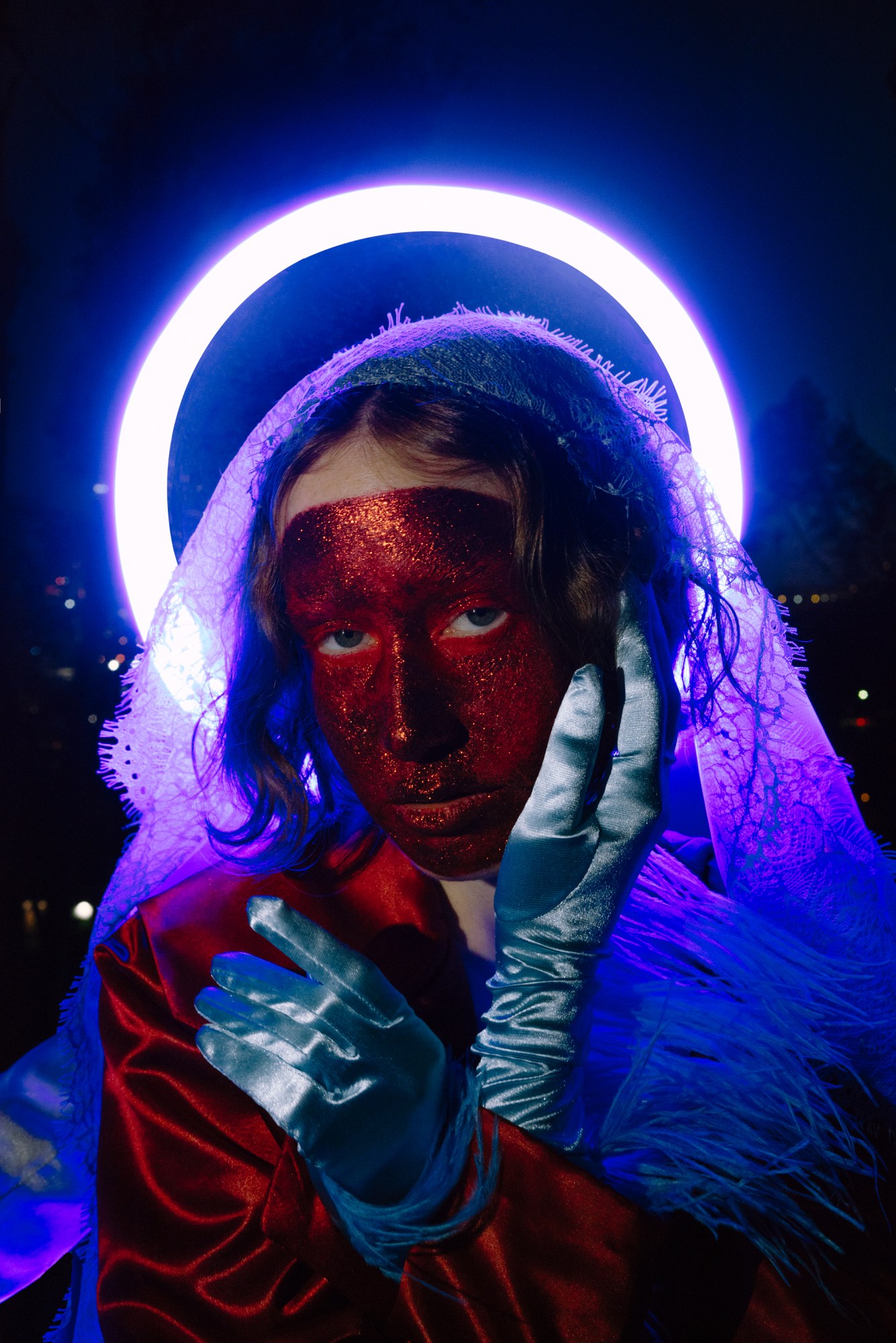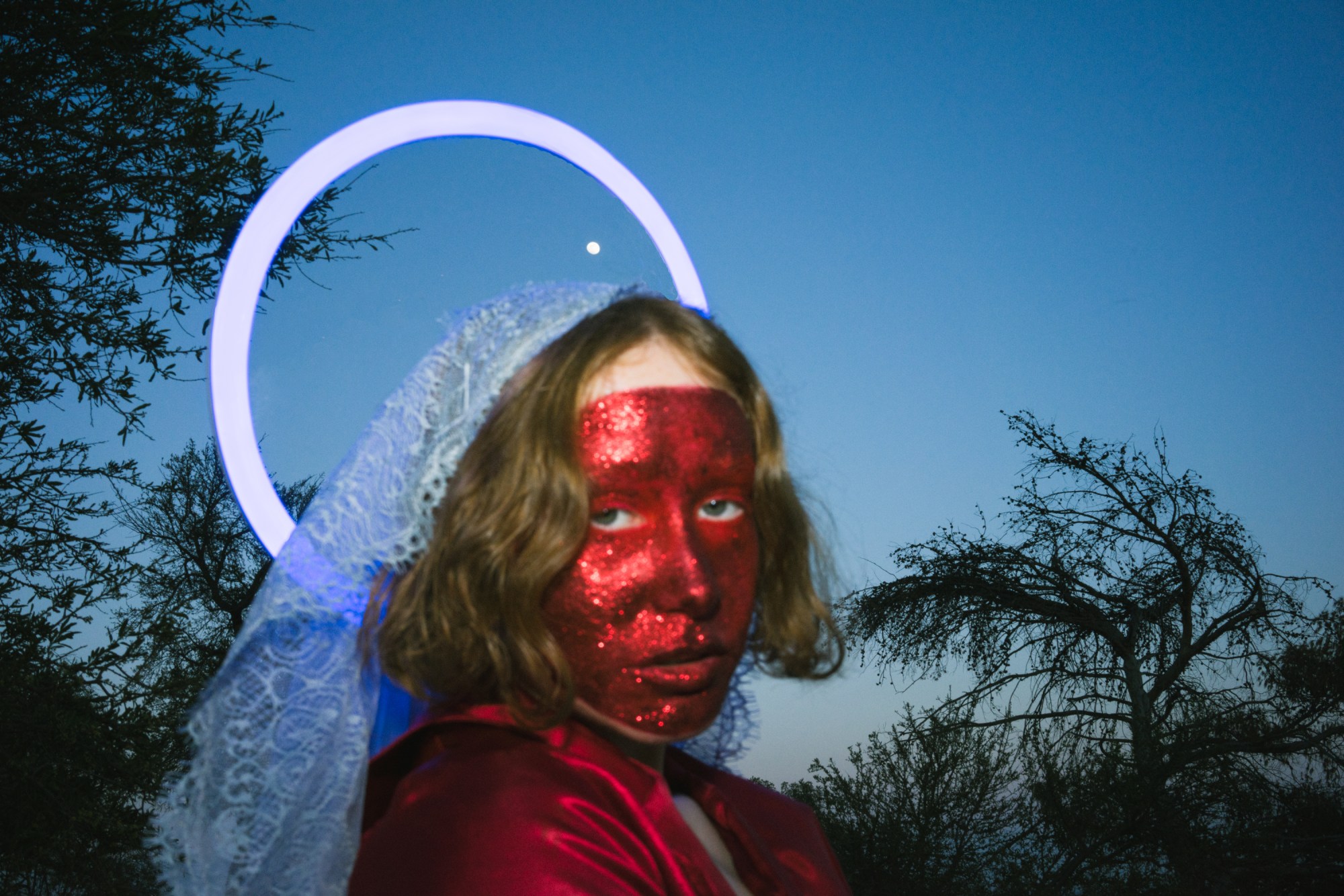“The name is the Latin word for voice,” vōx explains. “I knew that I wanted a name that was genderless, strong, one word, and would allow a world to be built around it without expectations.” Since forming her music project in 2015, the experimental pop singer has done just that, proving that vōx (pronounced “wokes”) is not only a musician, but a visual artist, a performer, and a character all rolled into one — who often takes the stage veiled and draped in lush red fabrics that add an element of theatrical mystery to her sets.
The idea of partially obscuring her face through costume comes from an interest in fashion and the desire to pull in religious themes of her youth. vōx grew up deeply religious in a small Minnesota town, where she turned to poetry and piano to channel her emotions and express her feelings more freely. Now based in L.A., music is still deeply personal for vōx and it’s not only apparent in her thoughtful lyrics, but the way she layers her vocals over intoxicating electronic beats to make her distinctive dark pop. The character that she’s created has given her the confidence to reckon with her upbringing on her upcoming EP “I Am Not A God,” which is co-produced by Alexander Vincent, to try to make peace with her anxieties, and to spread unconditional self-love.
”Writing this project has uncovered all the ways those ideas I was taught fucked with my self-worth and thus my ability to stand up for myself and my body,” she says. “I really want to create a safe space for anyone who feels shame in their humanity and imperfection to begin the unpacking and start the healing. That’s what making this music has started for me.”

In the early days, you’d often perform in vintage wedding gowns. When you first started figuring out what vōx was going to look like, what inspired you and how has that changed?
I definitely take inspiration from fashion. When I was a teenager, I loved Vogue and I remember looking at it, but I think it always felt really unattainable. In the beginning, I was a little bit limited by my knowledge of fashion. I found beautiful vintage wedding dresses and it became a thing, but I didn’t mean for it to become a thing. I meant to be pulling on religious imagery. Now it’s great to be able to work with costume designers that make things that fit much more into the visuals I want. Because I love being veiled, but it’s much more in a conceptual way. There is a part of fashion that’s attainable at any level, if you’re creative. And that changed everything.
So, when you think about vōx it’s much more than a music project — it’s an entire world.
It’s a world. And vōx works as a character in a sense. I think, I’m still figuring out what that means. I used to think that it was not me. But I think that the strength that I’ve found recently comes from realizing that vōx is me. Even if vōx was doing something that I wouldn’t necessarily think I could do… I am, you know? And I think that’s the magic of having a character and living with it and exploring parts of yourself.
I have so much stage fright as a normal human person. So much so that I get all these anxiety symptoms. I get really bad shakes, chills, nausea. And I always think I’m about to quit right before. Like I’m just gonna leave and we’ll cancel the whole project. But the character changed everything in that sense. When I was playing shows before as a singer-songwriter, I would sit at the keyboard and I would just play songs and my head would be down. And that was all I could do because I was so scared.
In what ways do body image and self-love play into the project?
I mean, I definitely have insecurities. Especially when I was younger, but I think a lot less now. And a lot of that healing has happened super recently and who knows if that’s age or it’s related to the project, but posing nude changed everything for me. It gives you so much confidence. Especially because I’ve always prioritized using my body as more of an art form. And I’ve never done any nude shoots where they feel sexual in any way, which I think is really empowering to say like, this is art, this isn’t sex.
What are some of the themes that you explore on your upcoming EP?
All of my music is obviously very personal. Aside from being to help others, it very much helps myself work through a lot of the things that I need to work through. All the songs I have been writing were kind of all about the same thing. They all in a sense were dredging up things that happened to me in my childhood and the church and the ways that those had manifested into my adult life and were still affecting me. And in regards to self-worth and just like, being in my body and having confidence sexually. All the things that I felt even my friends who weren’t religious were going through.

What was your religious experience like as a child?
I’ve only realized this recently, but I think one of the most interesting things about it was that my family wasn’t necessarily religious. It was a thing that we did every Sunday. We weren’t reading the Bible. We weren’t praying before meals. But I was very much drawn to religion and I think a lot of that was revolving around anxiety for me. In a sense, anxiety is a manifestation of faithlessness or hopelessness for the future. And I think I was really trying to find some sort of comfort in religion and all my friends in school were also religious. In the end, the anxiety was still there. There wasn’t a way to solve that with religion. And so I’ve felt very betrayed by religion. I felt like I didn’t fit in. Like I had all this doubt and that somehow made me a sinner and made me unworthy. It compounded all of these feelings and it also really fucked up sex for me, as it does for a lot of people. It just made me feel like I didn’t know how to connect spiritually with my body and like it was a sin.
Will you tell me about the cover for the EP?
It’s a visual representation of confirmation, which for me was like the pinnacle of feeling like a fraud and not feeling worthy. Sitting on that stage, it felt forced. To memorize and say these things that I wasn’t believing anymore. That felt just really, really awful. I remember being so anxious at 11. And so in a sense, I wanted to recreate that as the character vōx and take back some of the power that I felt I had lost there. The cover is me sitting on a church stage in a little metal folding chair in my full show performance costume, which is quite powerful and sexual, you know, just crazy looking.

We’re sharing a Grant Spanier-directed teaser for “I Can Feel Myself Leaning,” which is out this Friday. What does this song signify for you?
“I Can Feel Myself Leaning” is basically an emotional break down. I’m asking my partner if they’re sure they’ll still want me as I really am, with my habits, with my flaws. I wrote it in a moment of realization that there is no end point to our healing. It’s a process for life. I’m not going to wake up one day and say, ‘Now I’m good! I unconditionally love myself all the time. I forgive myself all the time.’ And that’s ok. We can only truly appreciate the moments of joy in contrast with our moments of sorrow.
Obviously, the project relies so much on being vulnerable and expressing these things in your music. Does it ever get easier?
It’s super challenging. I was not able to do it before I had a character to do it through. But that’s really the only way to connect with anyone is to be vulnerable. But I really was not able to. It’s super hard still. I think the other thing that really helped me was defining a purpose… once you really take the time to be like, why? Why do I like doing this and why is this great for society and why should I continue? I think defining those things just made it so much easier to push through anxiety, to be vulnerable, and to get to those places.

